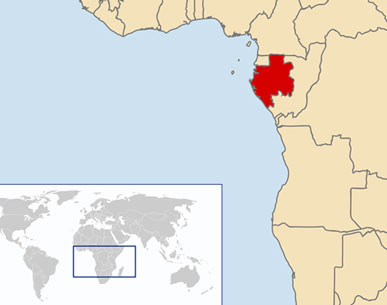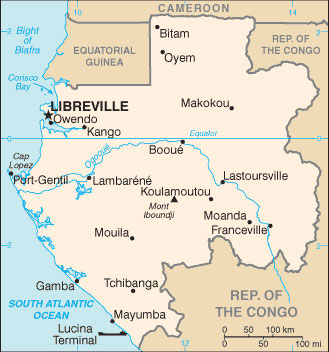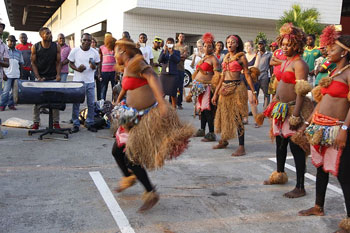
In the early hours Monday on January 7, a group of soldiers calling itself the “Patriotic Movement of the Defence and Security Forces of Gabon” (MPJFDS) under the leadership of Lieutenant Kelly Ondo Obiang, staged what appears to have been a failed coup.
The group declared its unhappiness “with the leadership of President Ali Bongo, who is recovering from a stroke [at a private residence in Rabat -] Morocco.” The attempted golpe came one week after Ali Bongo “spoke for the first time since the beginning of his convalescence [from the Cerebrovascular accident (CVA) – stroke -] he suffered in October 2018 in Riyadh – Saudi Arabia]”. The video of his New Year’s speech was recorded in Rabat, Morocco, and broadcast on Monday December 31, 2018.

For a country once reputed to be a haven of peace in Central Africa, what explains this coup attempt? The last time Gabon experienced a coup attempt was on February 18, 1964 but is now plagued with political violence as exemplified by the electoral crises of 2009 and 2016. So what changed? What led to the attempt to overthrow the Bongo dynasty by the handful of soldiers of the MPJFDS?
A close observation of events since 2009 shows that things seem to be changing since Ali Bongo came to power, taking over from his father. Political risk underwriters Exx Africa Business Risk Intelligence said in a recent report that the “failed military coup is indicative of broad socio-economic and political frustration with Gabon’s leadership… There remains a heightened risk of military and civil unrest as long as there is no clarity on the condition of President Bongo”.
Coups: the fate of authoritarian African states
It seems coup d’états are the main method through which Africa’s dictators, long-stay rulers and dynasties can be removed from power. As the incumbency of these authoritarian rulers becomes unduly extended, their ability to ensure the compliance of all sectors of society and state institutions, including the military and security apparatus begins to diminish.
We have seen this type of thing before. Firepower in hand, the armed and security forces once used against the populace are often the only group capable of bringing change knowing that a euphoric population will usually greet the coup with joy. Often what we see preceding the fall of African autocrats is mounting opposition, signs of growing discontent and increasing acts of courage to face the regime.
The fall of Burkina Faso’s Blaise Compaore in October 2014 after 27 years in power and Robert Mugabe’s demise after 37 years of iron rule in Zimbabwe largely depict the problems and outcomes of what I call authoritarian-overstretch. In Burkina Faso, a disgruntled population blocked Compaore’s third term bid and forced a President whose exit was long overdue out of power thanks to added pressure from the army. In Zimbabwe, strained civil-military relations and internal regime rivalries eventually brought Mugabe’s one-man rule to its end.
The idea of authoritarian-overstretch does not mean that authoritarianism should be tolerated if it is not long-drawn. Authoritarianism is bad whether it lasts a single second or lasts a thousand years. The concept merely attempts to capture the problems associated with Africa’s dictatorships in which a single individual stays in power decades.
Growing discontent against the Bongo dynasty
The same authoritarian-overstretch scenario is gradually playing out in Gabon, largely born from increasing frustrations with the Bongo dynasty and its performance at the helm of the Gabonese State. Ali Bongo came to power following the death of his father, Omar Bongo Ondimba in 2009. Omar Bongo ruled Gabon from 1967 when pioneer President Leon Mba died on November 28, 1967.

Many Gabonese saw Omar Bongo’s death as the opportunity for change. They were quickly disappointed as the political establishment made sure Omar’s regime would be perpetuated through his controversial son, Ali Bongo. Ali went on to officially win the elections of 2009 and 2016 but violent confrontations broke out following the announcement of the results of both polls.
The opposition rightly accused the system of being rigged and stacked against them. The electoral administration was tagged as a wing of the ruling party and the constitutional court accused of bias, especially in the 2016 post-election crisis. As dynastic rule clashed with voices calling for change, the armed and security forces were unleashed to “protect republican institutions” and ensure “law and order”. Civilian deaths followed.
Reinforcing dictatorship regardless of growing tensions
The 2016 electoral crisis led to talks between Bongo’s regime and the opposition. However, from what we can tell, the opposition seems to have instead opened a Pandora’s box for the regime as it gained only one concession from the talks with Ali Bongo, that is, a shift from the plurality system to a majority voting system. The opposition expected to benefit from the move but instead it gave Bongo the opportunity to use the negotiations to consolidate his power.
In effect, the new constitution, adopted in January 2018, was designed by a parliament dominated by the ruling Gabonese Democratic Party (PDG) and gave Bongo extensive powers. It also allowed Ali to rule for an unlimited number of seven-year terms as it did not repeal a 2003 amendment removing any term limits.
Under a framework of state capture, exemplified by Ali’s accession to power and the manner in which the Constitutional Court handled the post-electoral dispute of 2016, the 2018 constitutional amendments solidified Ali’s rule and further entrenched the Bongo dynasty giving Ali Bongo the solid chances to trail his father and die in power.
Breakthrough coup, the next milestone?
On October 24, 2018, Ali had a stroke. Ali’s prolonged absence and state of health created internal political tensions in the country. It was this that provided another window of opportunity for the opposition. Eventually, the opposition asked the Constitutional Court to declare a vacancy in accordance with the Constitution. However, the Constitutional Court unsurprisingly judged otherwise and instead transferred some of the President’s powers to the Vice President and the Prime Minister.
What followed was the coup attempt, largely demonstrating that as discontent increases in Gabon against the Bongo dynasty and the neo-patrimonial system behind its state capture, the likelihood that sections of the armed forces, in this case the ‘militariat’, will attempt to overthrow Ali Bongo in a breakthrough coup. The basis for the coup were claims of misrule by the Bongo leadership made by the MPJFDS.
In the pre-recorded video of December 31, 2018, Ali Bongo appeared to be more autonomous than Algeria’s wheelchair-bound President Abdelaziz Bouteflika. However according to analysis of the video, his eyes appeared to cross, signs of strabismus, and his speech was full of lisping. He also barely moved his head and right hand.
In the rather short video, a usually talkative Ali Bongo claimed “today, as you can see, I am better and I prepare you quickly to find you”. Presidential spokesman Ike Ngouoni predictably claimed after the speech that Ali’s appearance “is proof that President Ali Bongo is fully recovered. His health problems are now behind him”.
However, coup leader Lieutenant Kelly Ondo Obiang, in his initial declarations by radio broadcast argued otherwise, declaring that the president’s speech had instead “heightened doubts about the president’s ability to continue to assume the responsibilities of his office.”
It was with this logic he called on the people to descend into the streets to join the armed and security forces in a popular insurrection called “operation dignity” aimed at incapacitating all the enemies of the fatherland. He tried to appeal to the public by stating that the “coup was against “those who, in a cowardly way, assassinated our young compatriots on the night of August 31, 2016,” a reference to violence after Bongo was declared winner of a disputed election.”
A militariat revolt that failed
The soldiers’ attempt to associate the population to the coup was a bid to spur mass uprising and legitimise their coup attempt. It is highly probable that the coup plotters had little support from their colleagues and wanted to use mass demonstrations as leverage, the type that could potentially win support from the rest of the army.

The failure of the coup is therefore connected to the militariat nature of the coup’s leadership. A militariat is defined as a “ruling class resulting from a coup by junior officers and non-officers from the military”.
The population of Gabon was largely taken by surprise when the coup took place. A call by the army to overthrow a regime that had always been based on the support of the same armed and security forces fell on deaf ears.
The extent to which senior military officials and France, were involved in masterminding the coup is also not known, and the people were perhaps rightly suspicious.
Political Risk Remains in Gabon
While the government subsequently said it had, “put an end to the mutiny and arrested most of the mutineers”, the Bongo dynasty is not out of the bargain just yet. Ali’s impairment, and the anger from the opposition and sections of the population against the Bongo dynasty means political tensions are expected to persist. Such governance crises have constituted the domestic reasons for coups in other African States.
Deep reforms of the electoral administration to ensure free fair and transparent elections, inclusive of term limits, remains the solution to Gabon’s political woes. However, France’s role as a major spoiler must be taken into consideration as well. A departure from French neo-colonialism is an imperative for peace and security in francophone Africa. But that’s for another article.
David Anderson says
Excellent deep dive into the Gabon situation. Thank you.